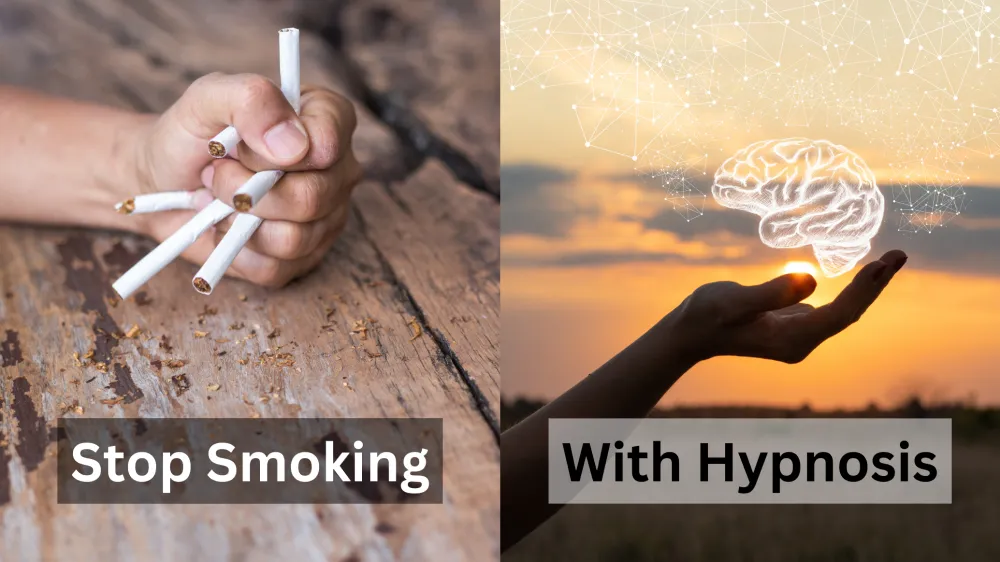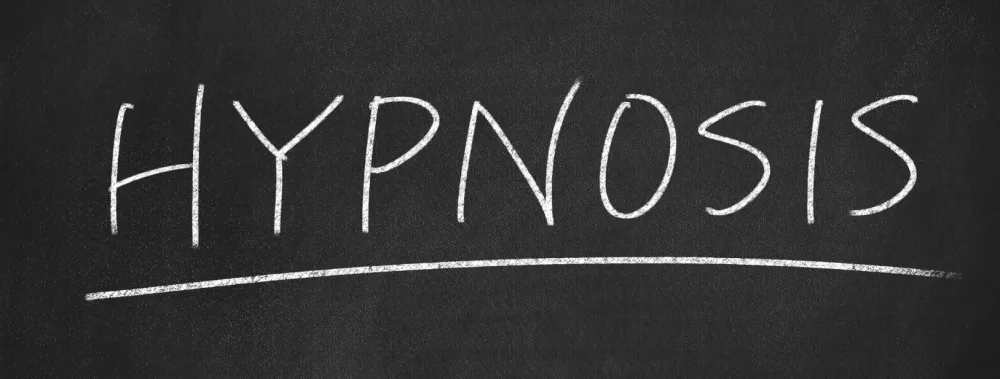Hypnosis To Stop Smoking
How It Works And What To Expect

Quitting smoking is an incredibly difficult task and it can take multiple attempts to finally be successful. Fortunately, recent research shows that hypnosis may be able to provide the help needed to get over the hump. Studies have been conducted that suggest hypnosis may effectively decrease withdrawal symptoms as well as cravings frequently associated with quitting tobacco use. Hypnosis could also help smokers learn healthy behaviors, change their perspectives on smoking, and focus more on the personal accomplishment of being a non-smoking individual. With nothing but positives associated with trying hypnosis for cessation of smoking, it could very well be the perfect tool for someone looking to kick the habit once and for all.
Hypnosis offers an alternative to traditional smoking cessation methods like nicotine replacement therapy and addresses the psychological and emotional aspects of quitting cigarettes. A hypnotherapist will guide you through sessions that explore the underlying motivations for your addiction to cigarettes and replace them with healthier habits and behaviors. While this method won’t guarantee success in every case, quitting smoking can make a dramatic difference to your overall health, resulting in a lowered risk of disease and premature death. Even if you’ve been smoking for years already, it is never too late to take control and start the journey towards improved well-being today.
Quitting cigarettes is one of the most effective ways to improve your health. Highlighting just how dangerous smoking can be, it is estimated that it causes almost half a million deaths annually in the United States. While the health benefits of quitting are well-known, many people may not realize the wide scope of them. By quitting cigarettes, you can reduce your risk for cancer in any area of the body, from head to toe as well as harm caused to virtually every organ. Over time, you will significantly reduce your chances of having illnesses caused by smoking and improve your overall quality of life.
In this article, we go over some of the dangers of smoking and the benefits of quitting no matter how long you've been smoking. Then we'll talk about hypnosis and how it can help
The Dangers Of Smoking

With over 1.1 billion people smoking worldwide according to estimates from the World Health Organisation, and 1 in 5 deaths in the United States due to smoking each year, it's clear that this unhealthy habit is a major public health concern. Smoking is responsible for an estimated 70% of all cases of lung cancer globally and has even been linked to accelerated aging. It causes more deaths than any combination of illegal drug use, alcohol use, car accidents, and firearm-related incidents put together. It's incredibly important to raise awareness about the health risks associated with smoking if we want to reduce its devastating impact on individuals and society as a whole.
The negative effects of smoking are numerous and range from things that are relatively minor to more severe health concerns.
Minor Effects:
Smelly hair
A dull sense of smell and taste
Yellow Fingers
Yellow teeth
Wrinkly skin
Anxiety and irritability
Persistant coughing
More Severe Effects:
Heart disease
Lung disease
Strokes
Diabetes
COPD
Poor vision
Blood clotting
Reduced immune system
Various cancers
Irritable bowel syndrome
Why Is It So Difficult To Stop Smoking

Despite knowledge of health risks and an estimated 70 percent of smokers wanting to quit, many find it a challenge they struggle to overcome. For most people, it takes multiple attempts to quit smoking before they are successful. One study found that it could take up to 30 attempts.
Nicotine dependence is usually the reason most people give for not being able to quit smoking. Nicotine is a stimulant that directly activates some of the brain’s key reward circuits, releasing dopamine and prompting the mind to continue a behavior it believes will result in further pleasure. Therefore, when someone quits smoking they must also fight against the influence of their own conditioned brain reward system as they go cold turkey and try to give up cigarettes for good.
Withdrawal Symptoms Of Quitting
One reason people start smoking again after they try to quit is because of the nicotine withdrawal symptoms associated with quitting. These start shortly after quitting and the phycological symptoms can last weeks or longer. Withdrawal symptoms include:
Aches and pains
Anxiety
Cravings for nicotine
Depression
Difficulty concentrating
Headaches
Irritability
Insomnia
Nausea
This is one area where hypnotherapy can help. Hypnosis has been proven to be a powerful tool to help people break the habit of smoking, and provide relief from withdrawal symptoms.
The Benefits Of Quitting Smoking

Quitting smoking is beneficial at any age. As soon as you stop your body will start to repair the harm done by smoking. The sooner you quit, the lower your risk of developing or exacerbating serious health conditions such as heart disease, stroke, and lung cancer. Quitting now could be the difference between life or death when dealing with the health risks posed by smoking.
Benefits Of Quitting Include:
Reduced risk of disease or premature death
Choosing to quit smoking can be one of the most life-changing decisions you ever make. You will improve your physical and mental well-being, enjoy an enhanced quality of life, as well as reclaim years that may otherwise have been taken away due to early death caused by tobacco use.
Higher energy levels
Smoking decreases oxygen in the bloodstream, robbing your body of important nutrients while making everyday tasks more challenging. But quitting smoking can reverse these negative effects and bring boosted alertness to the brain as well as improved functioning for lungs and muscles! This results in more overall energy.
Looking Younger
Smoking not only hurts your overall health, but it can also accelerate aging in the skin. Those who smoke may notice that their skin is dull, dry, and prematurely wrinkled as a result of their habit. The good news is that reversing the effects of smoking on the skin can be achieved by quitting smoking altogether and allowing the body to receive essential nutrients. With time, you will find that your complexion improves, and in some cases, you may even appear younger than your chronological age!
Breath easier
When you stop smoking your lungs will start to repair themselves, and you can improve your lung capacity by up to 10% within just one year. This improved breathing capacity means that you can perform daily tasks with greater ease and will no longer become out of breath as easily. Not to mention, the more unpleasant effects such as a 'smoker's cough' should start to fade away too. Asthma sufferers in particular may find that their condition eases off with this increased lung capacity from quitting smoking, or could see a complete disappearance of some symptoms.
Less Stress
Smokers often believe that nicotine helps to reduce stress, however, this is a false assumption. Nicotine is a stimulant. This means that although it helps give you a small boost of energy, large doses, in the long run, can increase stress on the body and take its toll over time. Quitting smoking reduces the strain that comes from the stimulant and helps you to feel more relaxed overall. Additionally, many people feel anxiety when thinking about how cigarette smoke is affecting their health and the health of the people around them.
Saving Money
With the cost of cigarettes rising in many places across the US, a pack-a-day habit has become increasingly expensive. On average, individuals spend $6.43 for a pack, with a monthly cost of around $192 and an annual cost of $2346. Though this may not seem like a large amount on the surface, when calculated over 10 years this number comes out to a hefty sum: an average of $23,460!
What Is Hypnosis

Hypnosis has been used to help treat a variety of physical and psychological health conditions, often when traditional medical methods have failed. It is defined as an altered state of awareness in which someone appears to be asleep or in a deep trance-like state. Commonly reported uses of clinical hypnosis include: alleviating chronic pain, curbing addiction, improving sleep patterns, and facilitating stress relief. In addition to treating physical issues, there is evidence that hypnosis can also help with emotional problems such as depression and anxiety. While the exact mechanisms of hypnosis remain unknown, this form of therapy shows promise in helping many people gain control over their health.
Hypnosis can seem like a mysterious, out-of-the-world experience, especially when portrayed on TV, in movies, or in stage shows. However, it is important to understand that people who undergo hypnosis are still aware and conscious of their surroundings despite appearing to be in some kind of "trance". Moreover, despite how it may look during many stage shows, a person cannot be made to do anything against their will while in a hypnotic state. In fact, neurological assessments carried out during hypnotic sessions have revealed an increased level of brain activity in comparison to regular wakeful states. It's important to note that most people experience a trance-like state while in hypnosis due to their ability to focus intensely on a single topic. Hypnosis can be an incredible tool for overcoming mental blocks and going deeper into one's consciousness to uncover a more profound understanding.
Hypnosis For Smokers

Hypnosis for smoking cessation is a well-studied, successful method to help people fight the habit of smoking. During the hypnosis session, professional hypnotherapists leverage an altered state of consciousness to make suggestions and implant ideas in the patient's subconscious mind. To discourage smoking, they might suggest that cigarettes taste terrible or similarly unpleasant scenarios. Having the patient imagine unpleasant outcomes, can be a powerful deterrent against a relapse.
Patients are also encouraged to imagine the pleasant outcomes they will get from stopping smoking, such as increased energy levels, a heightened enjoyment of meals, more time available to spend with friends and family members, and added longevity to their lives.
The overall idea is to have the patient let go of the identity of being a smoker and visually step into and accept the identity of being a nonsmoker. This type of cognitive reframing can be highly effective in helping people quit their smoking habit for good. Some hypnotists will also give their clients self-hypnosis audios to use after the in-person sessions.
Can Hypnosis Really Help Me Quit Smoking?
When discussing the effectiveness of hypnosis in helping people quit smoking, the results can vary greatly depending on whom you ask. Some people might dismiss it entirely while others sing its praises, so it is important to understand what contributes to a successful outcome when learning about hypnotherapy. The ability of the hypnotist, the technique used, and the motivation level of the patient all factor into the end result. It should also be noted that hypnosis is not mind control; success depends largely on the overall process and patient engagement during their treatment. Usually, the overall process will include one to two hypnotherapy sessions.
Can Everyone Be Hypnosis

Another thing to be aware of when researching hypnosis is that at some point you will come across the idea that not everyone can be hypnotized. This should be a red flag that the person or website doesn't truly understand hypnosis. In reality, hypnosis is a natural trance state that anyone can access.
We all experience numerous moments of being in a trance state going about our daily routine. When we watch engrossing movies or television shows, for example, our attention may become so deeply lost that we forget about the world around us. Another common example of unconsciously falling into a trance-like state is when you are driving and suddenly realize you have arrived at your destination without registering the aspects of the journey.
All of these instances illustrate the capacity to transition easily into a different level of consciousness, which holds for hypnosis as well. The instances where it is claimed someone is not hypnotizable are situations where the person is resisting for some reason, either consciously or because they are not comfortable.
Research On The Effectiveness Of Hypnosis To Quit Smoking

Randomized controlled trials into the effectiveness of hypnosis for smoking cessation are limited in both number and size. Some studies indicate that hypnosis may be beneficial, while others state there is not enough evidence to confirm the benefits of medical hypnosis for smoking cessation.
That being said here are several studies that showed positive results.
90.6% Success Rate for Smoking Cessation Using Hypnosis
The University of Washington School of Medicine conducted a clinical trial that studied the effects of utilizing hypnosis to treat tobacco use. The results revealed an impressive success rate, with 39 out of 43 consecutive patients remaining abstinent from tobacco use six months to three years post-treatment.
81% Reported They Had Stopped Smoking After Hypnosis
Texas A&M University conducted a study on the effectiveness of hypnosis in smoking cessation programs. Thirty smokers enrolled in an HMO were referred by their physicians and, after attending an initial consultation, 21 patients opted to receive hypnosis treatment. The study reported an 81% rate of people who stopped smoking after the completion of their treatment, with a remarkable 48% maintaining abstinence twelve months post-treatment.
Hypnosis Most Effective Says Largest Study Ever: 3 Times as Effective as Patch and 15 Times as Effective as Willpower.
A scientific meta-analysis showed that hypnosis is the most effective method of quitting smoking. Combining study results of 72,000 individuals from America and Europe, researchers found that on average, hypnosis was three times more successful than nicotine replacement methods and fifteen times more successful than attempting to quit cold turkey. The study's findings, which were published in the University of Iowa's Journal of Applied Psychology, prove that hypnosis is a viable option for those who are struggling to give up smoking.
More Studies Such As:
87% Reported Abstinence From Tobacco Use With Hypnosis
Hypnosis Patients Twice As Likely To Remain Smoke-Free After Two Years
Hypnosis More Effective Than Drug Interventions For Smoking Cessation
Are There Any Risks To Using Hypnosis To Stop Smoking?

Hypnosis, also known as hypnotherapy, is an intriguing form of treatment that many are unfamiliar with. Contrary to popular belief, it is not a mysterious or magical experience; people remain awake and aware, in control at all times.
Hypnotherapy is a naturally occurring state of focused concentration that can be used to help achieve desired outcomes. Researchers have found that this form of therapy has no side effects, meaning there's no need for worry if you're considering using hypnosis for personal improvements.
How To Find A Hypnotist To Help You Stop Smoking
If you want to quit smoking, one of the best and most successful methods is hypnosis. Although it is a powerful tool, the results will depend heavily on the skill of the hypnotist you choose. Make sure that any practitioner you seek out is certified and experienced in dealing with whatever issue you are looking to address.
So when looking for a hypnotist to help you stop smoking, look for a hypnotist who specializes in this area and has shown excellent results. Doing your research and taking the extra steps to find an experienced specialist will make all the difference when it comes to achieving lasting results.
Conclusion
Quitting smoking is one of the most difficult things a person can do. Everyone knows about the health risks associated with smoking, yet cigarettes remain incredibly addictive and many times require more than willpower to conquer. In such cases, hypnotherapy can provide a useful tool for breaking the smoking habits of those who are ready to quit. By targeting the underlying triggers, hypnotherapy works to change your mindset towards smoking, providing unpleasant images and making it easier to resist cravings. Hypnotherapy has plenty to offer those who wish to take control and finally quit cigarettes for good.

Disclaimer
Results may vary from person to person. The services we provide use current information and hypnotic techniques appropriate and tailored to your situation. Our hypnotic processes and services are not meant to diagnose or treat any disease. We provide information, education, and motivation that will guide you toward being more effective in helping yourself and living to your best potential.
Copyright © 2022 MentalImpactHypnosis.com. All rights reserved.

